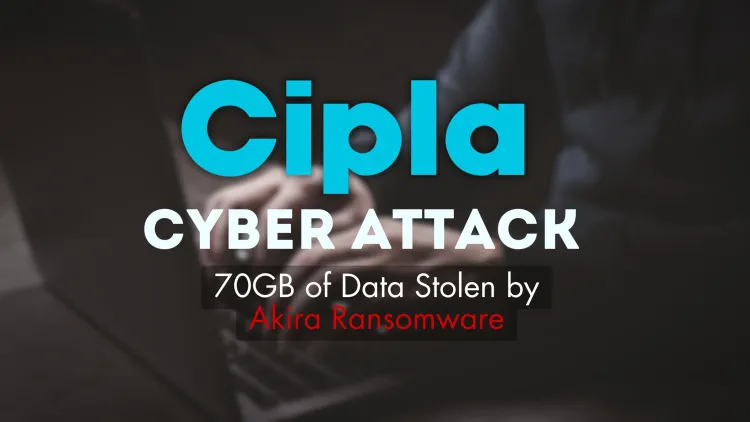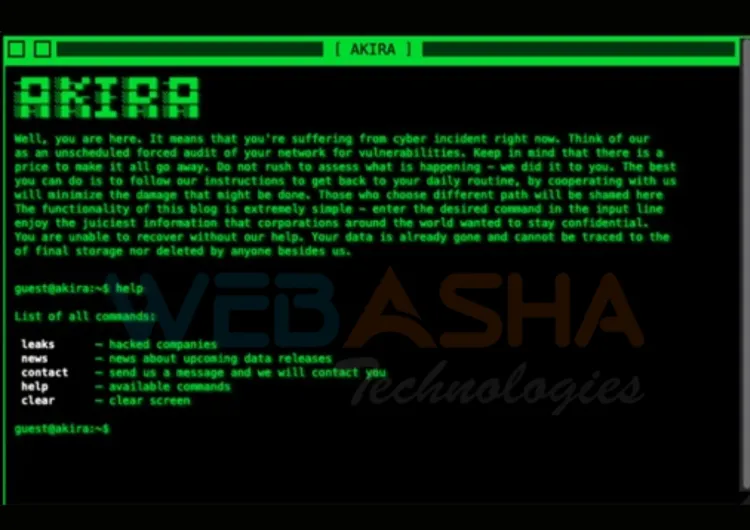Cipla Cyberattack | 70GB of Data Stolen by Akira Ransomware
The Cipla cyberattack, allegedly orchestrated by the Akira ransomware group, resulted in the theft of 70GB of sensitive data. This breach targeted a prominent player in the pharmaceutical industry, raising concerns about data privacy, patient information, and cybersecurity in critical sectors like healthcare. The Akira group is known for using a double extortion strategy, encrypting files and stealing data to demand ransoms. This incident highlights the need for robust cybersecurity measures across industries dealing with sensitive data.

The world of cybersecurity is buzzing with alarming news: Cipla, one of India’s largest pharmaceutical companies, has reportedly fallen victim to a significant ransomware attack. The attack, allegedly carried out by the Akira ransomware group, has sent shockwaves through the pharmaceutical industry. The cybercriminals claim to have stolen 70GB of sensitive data from Cipla’s global operations, raising serious concerns about data security and patient privacy.
This blog will unpack what happened, why it matters, and the lessons we can learn from this incident.
The Alleged Breach: What We Know
Cipla, a multinational company with 47 manufacturing facilities worldwide and a presence in 86 countries, was reportedly targeted by the notorious Akira ransomware group. The attackers allege they have exfiltrated 70GB of sensitive data, which includes:
- Personal medical records detailing prescribed medications.
- Internal financial documents, likely including budgets, profits, and other business metrics.
- Customer contact details, including phone numbers and email addresses.
- Employee contact information, potentially compromising their privacy.
Akira publicized this claim on their dark web portal, a space often used by ransomware groups to display their victims and stolen data. This bold announcement raises concerns about the consequences of such a breach.
Why Cipla Was a Target
Cipla’s global footprint and critical role in producing and distributing pharmaceuticals make it a high-value target for cybercriminals. A successful attack on a company like Cipla has far-reaching consequences, including:
- Patient privacy risks: If medical records are exposed, it could lead to personal embarrassment or harm.
- Business disruption: Cipla’s operations could be delayed due to compromised systems.
- Reputation damage: Trust among customers and stakeholders could be significantly eroded.
Understanding Akira Ransomware Group
The Akira ransomware group, which surfaced in early 2023, has quickly established itself as a major player in the cybercrime world. Here’s how they operate:

Their Tactics
-
Double extortion strategy:
Akira doesn’t just encrypt files; they also steal data. This dual approach means they can demand a ransom for decryption and threaten to leak sensitive information if their demands aren’t met. -
Sophisticated tools:
The group uses advanced encryption methods like ChaCha2008 and exploits vulnerabilities such as:- Infected email attachments.
- Weaknesses in Virtual Private Networks (VPNs).
-
Massive data dumps:
Recently, Akira released information from 35 organizations in a single day, their largest leak to date. The Cipla breach seems to align with their pattern of attacking high-profile targets.
The Bigger Picture: Ransomware in Healthcare
The Cipla incident is part of a troubling trend where ransomware groups target critical sectors like healthcare and pharmaceuticals. Why are these industries so vulnerable?
- High-value data: Medical records, research data, and financial documents are extremely valuable on the black market.
- Global impact: Disrupting these industries can affect millions, making them more likely to pay ransoms.
- Outdated systems: Many healthcare organizations rely on older technology, which is easier to exploit.
What Can Be Done?
This incident highlights the urgent need for robust cybersecurity measures. Organizations, especially those in critical sectors, must prioritize proactive strategies to defend against ransomware attacks:
-
Employee Training:
Many ransomware attacks begin with phishing emails. Regular training can help employees recognize and avoid these threats. -
Regular Audits:
Routine security checks can identify and fix vulnerabilities before attackers exploit them. -
Endpoint Protection:
Advanced tools that detect and block ransomware in real-time are essential. -
Data Backup:
Keeping secure backups ensures that organizations can recover their data without paying ransoms. -
Incident Response Plan:
A well-prepared plan can minimize the damage during a cyberattack.
The Road Ahead for Cipla
As of now, Cipla has not confirmed or denied the claims made by the Akira group. However, if the breach is verified, it will serve as a wake-up call for the entire pharmaceutical industry. With ransomware attacks becoming more sophisticated, companies must stay ahead by investing in the latest cybersecurity technologies and practices.
Conclusion
The alleged Cipla breach by the Akira ransomware group is a stark reminder of the evolving threat landscape. Industries handling sensitive data cannot afford to take cybersecurity lightly. By learning from incidents like these, organizations can better prepare themselves for future challenges.
Cybersecurity isn’t just an IT issue; it’s a business priority that impacts everyone—from employees to customers and even the global economy.
FAQ:
1. What happened in the Cipla cyberattack?
Cipla, a large pharmaceutical company, was reportedly attacked by the Akira ransomware group, which claims to have stolen 70GB of sensitive data, including medical records and financial documents.
2. Who is responsible for the Cipla attack?
The Akira ransomware group is suspected to be behind the attack.
3. What data was stolen in the Cipla cyberattack?
Sensitive data such as personal medical records, internal financial documents, customer and employee contact details were reportedly stolen.
4. Why was Cipla targeted by hackers?
Cipla is a global pharmaceutical leader with valuable data, making it a high-value target for cybercriminals.
5. What is Akira ransomware?
Akira ransomware is a type of malicious software that encrypts files and steals data, often demanding a ransom for decryption and threatening to leak the stolen information.
6. How do ransomware groups like Akira operate?
They use tactics such as double extortion, encrypting files and stealing data, exploiting vulnerabilities in systems, and releasing large dumps of stolen data.
7. Why are healthcare organizations targeted by ransomware?
Healthcare organizations deal with high-value data, including medical records and research data, which makes them attractive targets for cybercriminals.
8. What steps should organizations take to prevent ransomware attacks?
Organizations should focus on employee training, regular security audits, endpoint protection, secure data backups, and having a solid incident response plan.
9. How does ransomware affect businesses?
Ransomware attacks can lead to business disruptions, loss of customer trust, financial damage, and reputational harm.
10.What can companies learn from the Cipla attack?
Companies should prioritize cybersecurity, invest in modern security tools, and ensure a proactive approach to protect sensitive data.











![Top 10 Ethical Hackers in the World [2025]](https://www.webasha.com/blog/uploads/images/202408/image_100x75_66c2f983c207b.webp)



![[2025] Top 100+ VAPT Interview Questions and Answers](https://www.webasha.com/blog/uploads/images/image_100x75_6512b1e4b64f7.jpg)







